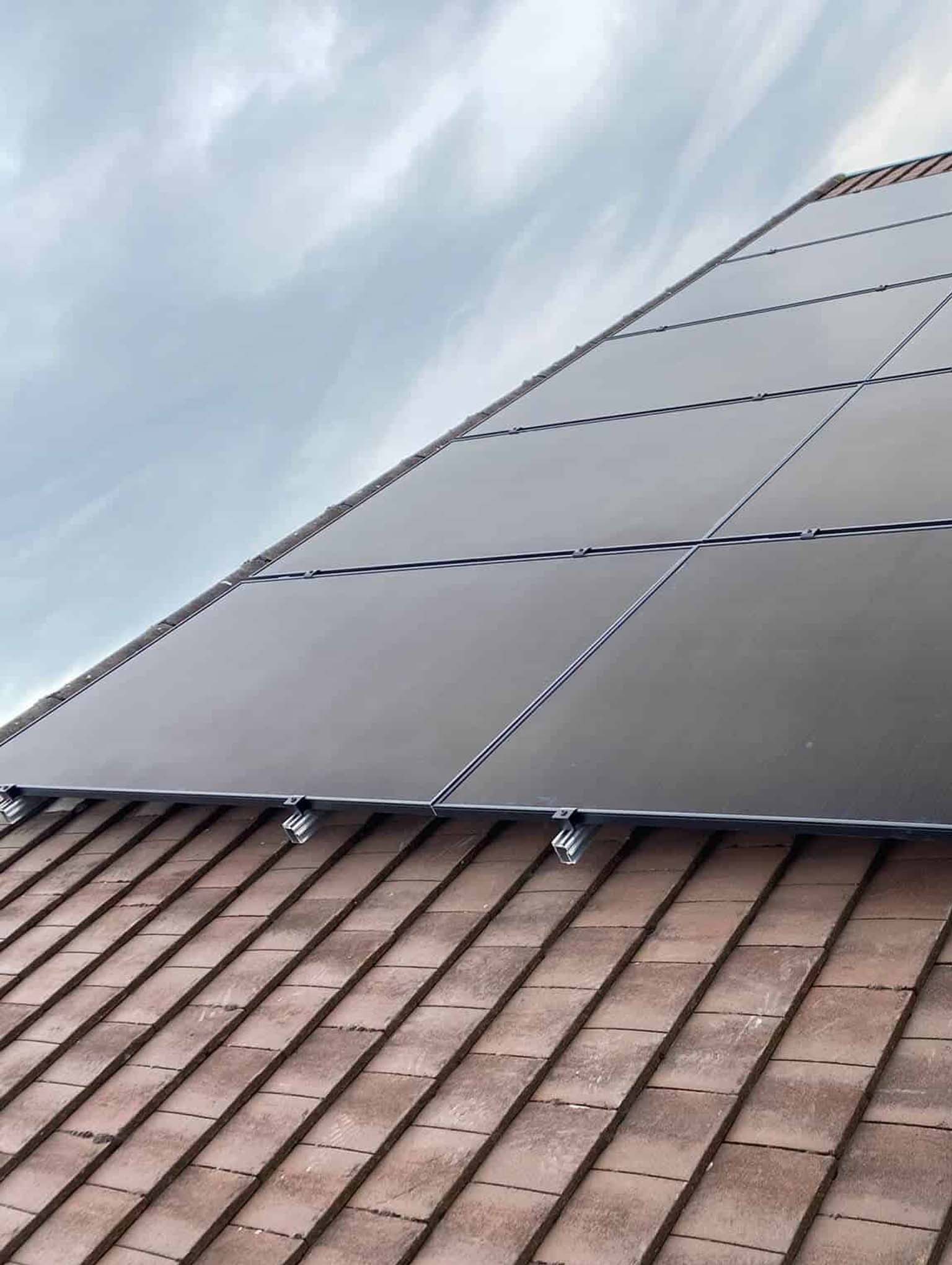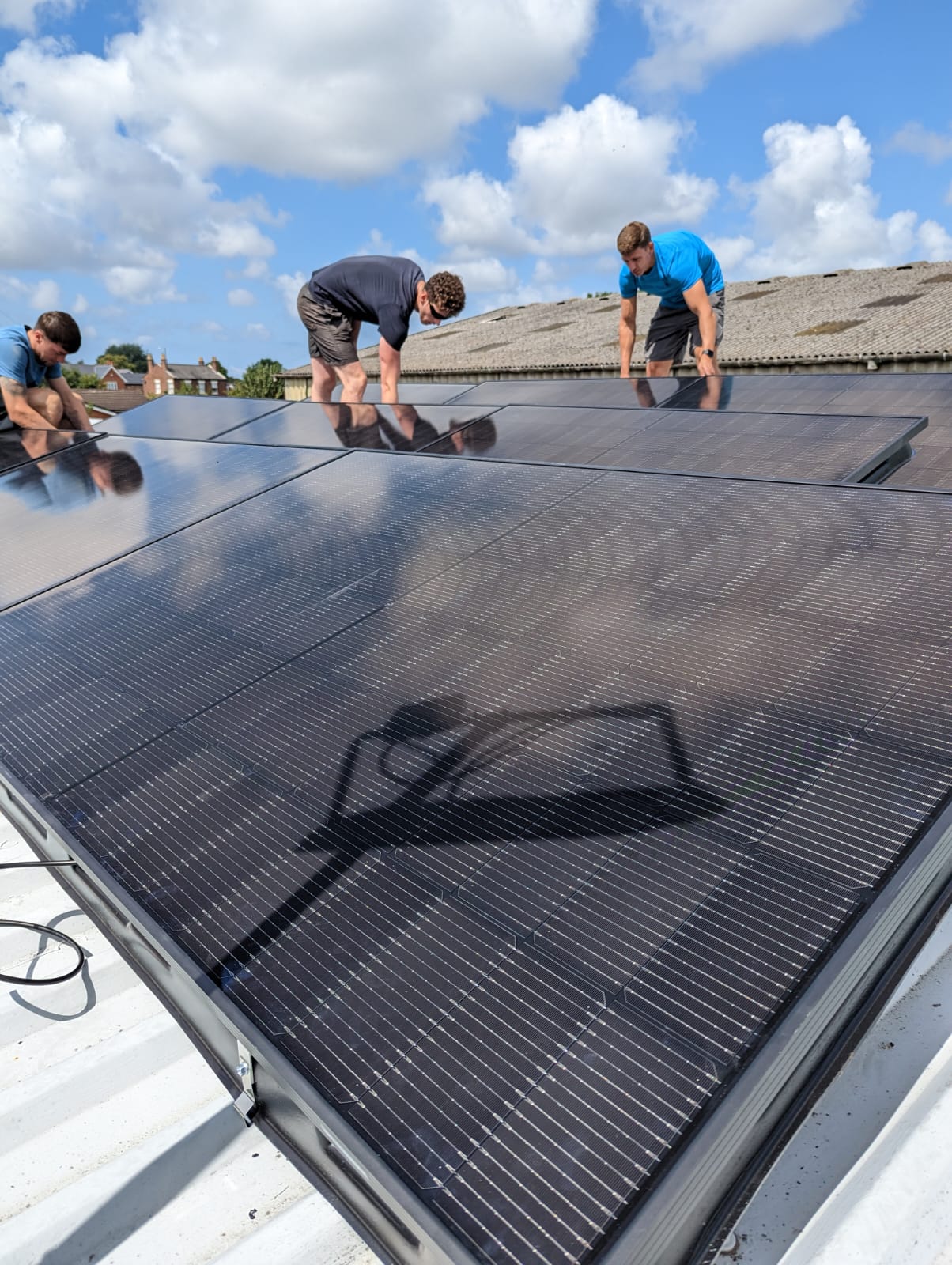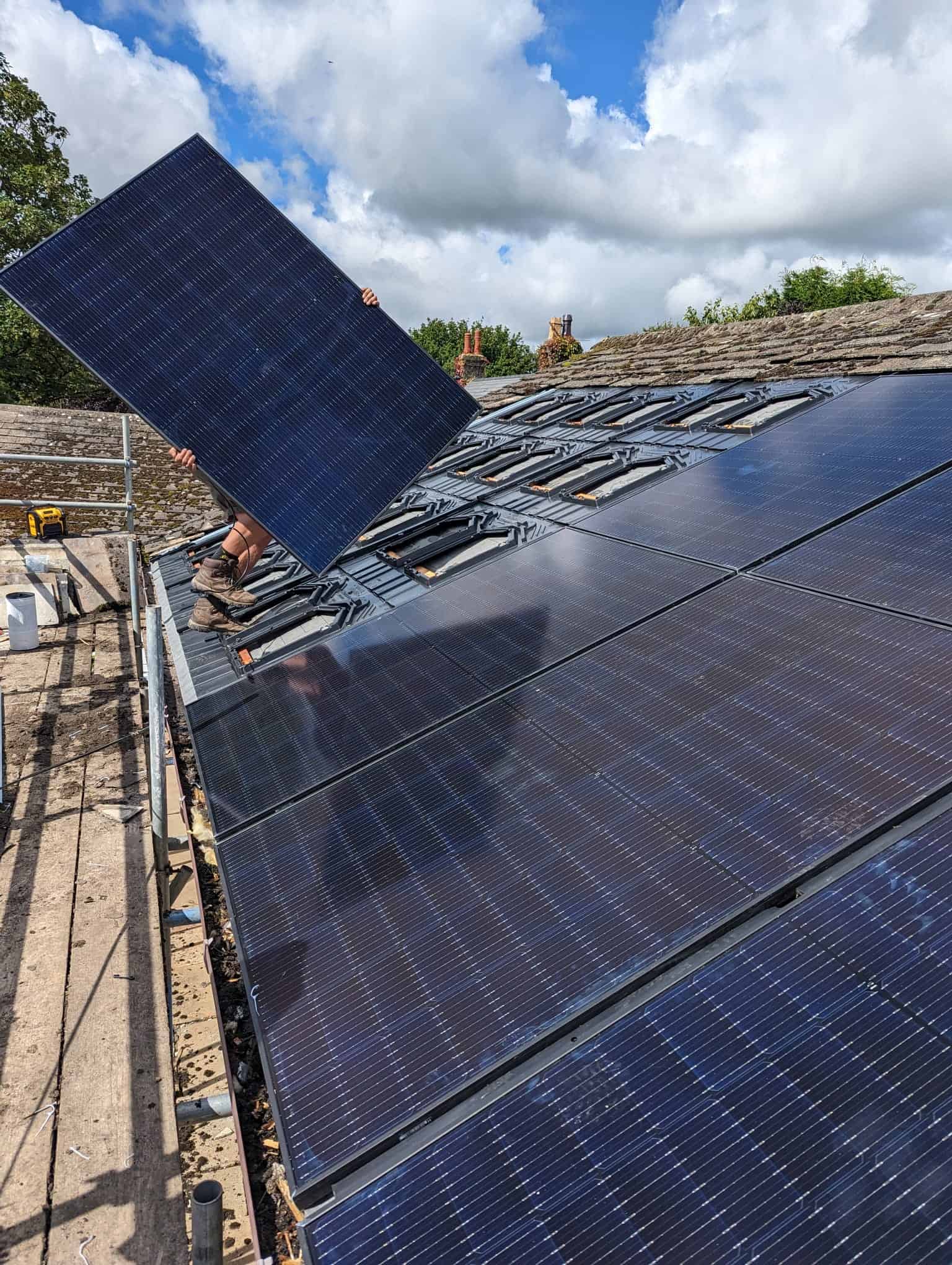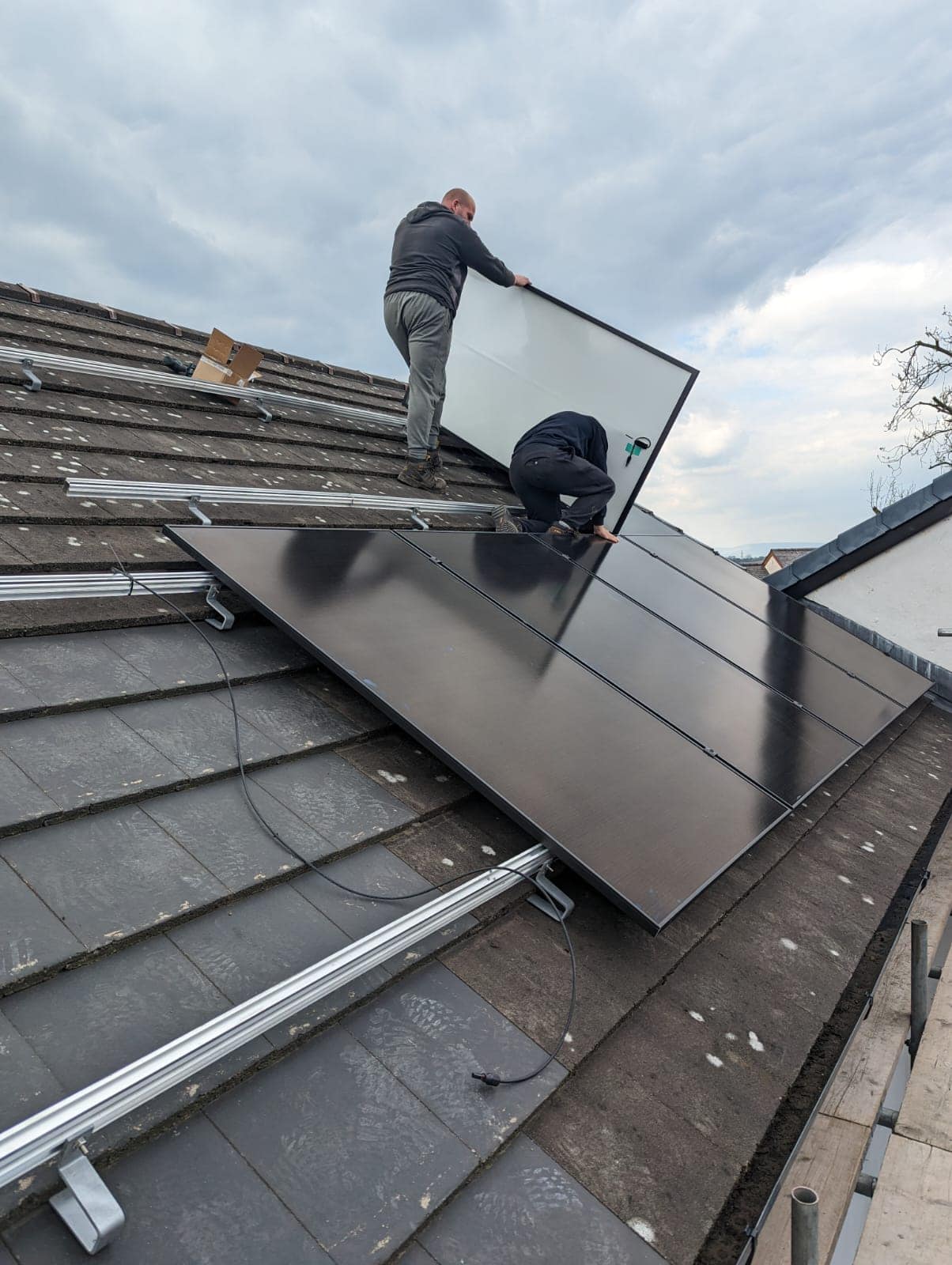Local Cricket Club solar system Installation Chorley’s weather, known for its unpredictable nature, lived up to its reputation during this recent solar system installation. However, our dedicated team was...
Solar Panels in the UK
Introduction
The shift towards renewable energy sources has become increasingly crucial, especially in the context of climate change and rising energy costs. In the UK, solar panels are emerging as a viable solution to address both economic and environmental challenges. This article explores the benefits of solar panels, delving into their role in the UK’s energy landscape, the economic advantages, and their environmental impact, while also addressing the associated challenges and considerations.
Understanding the Current Energy Landscape in the UK
Rising Electricity Prices
Electricity prices in the UK have been on a consistent upward trend, driven by various factors including global market fluctuations, regulatory costs, and the need for infrastructure improvements. This increase poses a significant burden on households and businesses alike, prompting a search for cost-effective alternatives. Solar energy presents an attractive option, allowing consumers to generate their own electricity and reduce dependency on the grid.
By investing in solar panels, consumers can shield themselves from the volatility of energy prices. As solar technology continues to improve and become more affordable, the financial justification for switching to solar becomes increasingly compelling.
Dependence on Non-Renewable Energy Sources
The UK has traditionally relied on fossil fuels, including coal, oil, and natural gas, to meet its energy needs. This reliance not only contributes to greenhouse gas emissions but also raises concerns about energy security and sustainability. Transitioning to renewable energy sources, such as solar, can reduce this dependency and enhance the nation’s energy independence.
As the government aims for net-zero carbon emissions by 2050, solar energy stands out as a primary asset in achieving this goal. It offers a clean, inexhaustible energy source that can be harnessed throughout the year, particularly in a country that receives a significant amount of sunlight even during winter months.
The Role of Solar Energy in the UK
Overview of Solar Panel Technology
Solar panels work by converting sunlight into electricity through photovoltaic (PV) cells. These cells are made up of semiconductor materials that generate an electric current when exposed to sunlight. The technology has evolved significantly, leading to higher efficiencies and lower production costs, making solar energy more accessible to the general public.
In addition to traditional solar PV systems, there are also solar thermal systems that harness solar energy for heating water. This diversification in solar technology allows for various applications, ranging from residential rooftops to large-scale solar farms, enhancing the overall energy mix in the UK.
Government Incentives and Support
The UK government has implemented various incentives to promote the adoption of solar energy, including feed-in tariffs, tax credits, and grants for homeowners and businesses investing in solar technology. These incentives serve to lower the initial costs associated with solar panel installations, making them more appealing to potential users.
In addition to financial incentives, the government has also set ambitious targets for renewable energy production, aimed at expanding the solar energy capacity significantly. Such policies not only encourage investment in solar technology but also foster an overall cultural shift towards sustainability.
Economic Benefits of Solar Panels
Long-term Cost Savings
One of the most compelling reasons to invest in solar panels is the potential for long-term cost savings. Once installed, solar panels can significantly reduce or even eliminate electricity bills, allowing homeowners and businesses to redirect funds towards other essential needs. Over time, the savings can amount to thousands of pounds, providing a substantial return on investment.
Moreover, many solar panel systems come with warranties that guarantee performance for 20-25 years, ensuring that the benefits extend well beyond the initial investment period. As energy prices continue to rise, the savings associated with solar energy are set to become even more pronounced.
Increased Property Value
Research indicates that homes equipped with solar panels often see an increase in property value. Prospective buyers are increasingly attracted to properties that offer lower utility bills and the benefit of renewable energy sources. This trend is particularly relevant in urban areas where energy costs are higher, making solar panels an attractive investment for homeowners.
In addition, as the UK government continues to push for renewable energy, properties with solar installations may become more desirable, further increasing their market value. Thus, investing in solar technology not only provides immediate financial relief but also enhances long-term asset value.
Job Creation in the Renewable Sector
The growth of the solar energy sector has created numerous job opportunities in the UK. From research and development to manufacturing, installation, and maintenance, the solar industry encompasses a diverse range of roles. This job creation is vital for supporting the economy, particularly as traditional industries face decline due to shifting energy policies.
As more individuals and businesses invest in solar energy, the demand for skilled workers in this field is expected to rise. This trend not only provides opportunities for employment but also fosters the development of a skilled workforce that can support further advancements in renewable energy technology.
Environmental Benefits of Solar Panels
Reduction in Carbon Emissions
One of the most significant environmental benefits of solar panels is their ability to reduce carbon emissions. By harnessing clean energy from the sun, solar panels help to minimize reliance on fossil fuels, which are the primary contributors to greenhouse gas emissions. This reduction is essential for combating climate change and improving air quality in urban areas.
Studies have shown that integrating solar energy into the national grid can lead to substantial reductions in carbon footprints, making it a crucial component of the UK’s strategy for achieving net-zero emissions. Furthermore, as technology evolves, the efficiency of solar panels is expected to improve, further enhancing their environmental benefits.
Conservation of Natural Resources
Solar energy is a sustainable resource, meaning that it can be harnessed without depleting natural reserves. By transitioning to solar power, the UK can reduce its dependence on finite resources such as coal and natural gas, which require extraction and refining processes that can be harmful to the environment.
Additionally, solar panels do not consume water during operation, unlike many traditional energy generation methods that require significant water for cooling. This conservation of water resources is particularly important in times of drought or water scarcity, highlighting solar energy’s role in promoting environmental sustainability.
Promoting Biodiversity
Interestingly, solar farms can also contribute positively to local ecosystems. When properly designed and managed, solar installations can coexist with agricultural practices, promoting biodiversity. For instance, grazing sheep can coexist with solar panels, allowing for dual land use that supports wildlife while generating energy.
Furthermore, the installation of solar panels can lead to the creation of green spaces that provide habitat for various species. This dual benefit of energy production and biodiversity conservation illustrates the holistic advantages of solar technology in the fight against climate change.
Case Studies
Residential Installations
Residential solar installations have gained popularity across the UK, with homeowners increasingly opting for solar panels to reduce energy bills and promote sustainability. Various case studies showcase the effectiveness of solar technology in residential settings. For example, a family in London reported a 70% reduction in their electricity bills after installing a solar PV system, illustrating the financial benefits.
Moreover, homeowners often experience a rapid return on investment, with many installations paying for themselves within a few years. The positive experience of these homeowners encourages others to consider solar energy as a viable alternative, further driving demand.
Commercial Implementations
Businesses, too, are capitalizing on the advantages of solar energy. Large corporations, such as supermarkets and manufacturing facilities, have undertaken significant solar panel installations to reduce operating costs and enhance their sustainability credentials. For instance, a major supermarket chain reported annual savings of millions of pounds by adopting solar technology across its stores.
These commercial implementations not only contribute to cost savings but also improve a company’s public image. Demonstrating a commitment to renewable energy can attract environmentally conscious consumers and investors, making solar energy a strategic business decision.
Community Solar Projects
Community solar projects represent a collaborative approach to solar energy, allowing multiple households to benefit from a shared solar installation. These projects are particularly beneficial for individuals who may not have suitable rooftops for solar panels or those who cannot afford the initial investment. For example, a community solar farm in rural England has enabled dozens of local families to access solar energy, reducing overall energy costs.
These projects foster a sense of community and collaboration, as members invest collectively in renewable energy solutions. Moreover, they serve as an educational tool, raising awareness about the benefits of solar energy and inspiring further uptake across communities.
Challenges and Considerations
Initial Investment Costs
Despite the numerous benefits of solar panels, the initial investment cost remains a barrier for many potential users. While prices have decreased significantly in recent years, the upfront costs associated with solar installations can still be daunting. For some families and small businesses, securing financing can prove challenging, potentially delaying the transition to solar energy.
However, various financing options are available, including loans, leasing, and power purchase agreements (PPAs), which can mitigate the financial burden. Additionally, government incentives can further alleviate initial costs, making solar energy more accessible to a broader audience.
Space and Location Limitations
Another challenge associated with solar energy is the need for adequate space and suitable locations for installation. Not all properties are conducive to solar panel installation, particularly in urban areas where space is limited. Furthermore, the effectiveness of solar panels is influenced by factors such as orientation, shading, and geographical location.
To overcome these limitations, innovative solutions such as solar canopies and building-integrated photovoltaics (BIPV) are emerging. These technologies allow solar energy to be harnessed in spaces where traditional installations may not be feasible, expanding the potential for solar adoption across various environments.
Conclusion
Summary of Benefits
In conclusion, the adoption of solar panels in the UK presents a myriad of economic and environmental benefits. From reducing electricity bills and increasing property values to promoting sustainability and job creation, solar energy stands out as a crucial component of the nation’s energy strategy. As the government continues to support renewable energy initiatives, the role of solar technology in achieving net-zero emissions becomes even more vital.
While challenges exist, innovative financing options and technologies are making solar energy more accessible than ever before. By investing in solar panels, individuals and businesses can contribute to a greener future while reaping significant long-term benefits.
FAQs
1. How much can I save on my electricity bills by installing solar panels?
The savings can vary depending on factors such as the size of the system, the amount of sunlight your location receives, and your electricity usage. On average, homeowners can save between 50% and 70% on their electricity bills.
2. Are there any government incentives for installing solar panels in the UK?
Yes, the UK government offers various incentives, including feed-in tariffs and grants, to encourage the adoption of solar energy. These initiatives help to reduce the initial costs of installation.
3. How long do solar panels last?
Most solar panels come with warranties of 20-25 years, and many can continue to produce electricity beyond that time frame, although their efficiency may decrease slightly over the years.
4. What happens if my solar panels generate more electricity than I use?
If your solar panels generate excess electricity, you may be able to sell it back to the grid, depending on your energy supplier’s policies and local regulations.
5. Is solar energy reliable in the UK, given its weather conditions?
Yes, solar panels can generate electricity even on cloudy days. While sunny weather enhances energy production, advancements in solar technology allow for efficient energy generation under various weather conditions.
All of these factors are important to consider when permitting your solar system, and can help streamline your process. Take the time to consider these often-overlooked aspects
All of these factors are important to consider when permitting your solar system, and can help streamline your process. Take the time to consider these often-overlooked aspects
All of these factors are important to consider when permitting your solar system, and can help streamline your process. Take the time to consider these often-overlooked aspects
All of these factors are important to consider when permitting your solar system, and can help streamline your process. Take the time to consider these often-overlooked aspects






